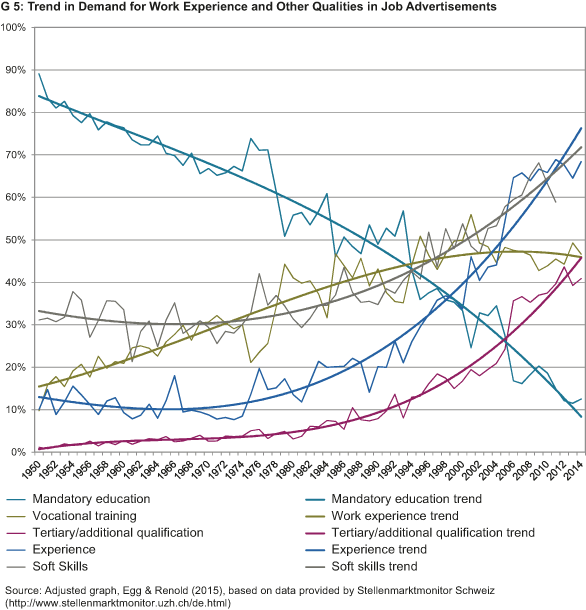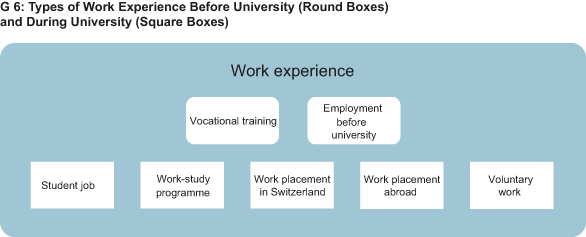Job Without Work Experience?
- Labour Market
- KOF Bulletin
- Education
Companies are increasingly asking for a certain amount of work experience in job advertisements. How can graduates gain such experience and which type of experience will actually help them get the job? A recent KOF study shows that work placements abroad and voluntary work, in particular, seem to have little prospect of success.
Qualifications are generally expected to guarantee future success in the world of work. However, the transition from university to professional life is not always easy. Graduates looking for jobs consider lack of work experience to be the biggest hurdle, as the results of the Federal Statistical Office’s biennial graduate survey shows (Koller & Rüber, 2014). The University of Zurich’s ‘Stellenmonitor’ (job market guide) is also reporting increasing demand for work experience in job advertisements (see G 5). In 2014, around 70 per cent of all job advertisements mentioned work experience as one of the main requisites, tendency rising.
This trend goes hand in hand with growing demand for tertiary education (i.e. higher vocational training and university education), additional qualifications and soft skills. When new employees arrive with work experience, orientation periods are shorter and recruitment costs lower. Consequently, students no longer work exclusively for financial reasons but also with a view to improving their chances on the employment market.
Opportunities for graduates to gain work experience
In general terms, there are seven different ways in which graduates can gain work experience (see G 6). Before university, they have two options: Students choosing a vocational course will gain work experience during their apprenticeship. Grammar school graduates who opt for universities of applied sciences will complete a so-called ‘work experience year’ which they must undertake in the field of their future studies before entering university. Furthermore, there are the casual evening, weekend or holidays jobs that students take, as well as any gainful employment that takes place between upper secondary and university.
While at university, students can gain work experience in five different ways. First, they can take up a student job. Another option is work-study programmes, which allow students to follow a degree course while working in their chosen field. Those who do not have the time to work during the semester can look for work placements in the holidays or during a sabbatical. Work placements can be done either in Switzerland or abroad. In Switzerland, voluntary work for associations or other organisations is quite popular. These kind of jobs also provide students with work experience as they allow them to acquire human capital while training children or organising events.
The chart shows the numerous options students have to gain work experience. University graduates can also gather several different types of work experience, which, however, will not be discussed in the following.
Which type of work experience do employers look for in graduates?
To investigate whether the different types of work experience make it easier for graduates to enter the employment market and whether employers consider all types to be of equal value, KOF’s Ursula Renold and Maria Esther Egg use data from the first survey of university graduates in the years 2011 and 2013. Their focus is on graduates with bachelor and master degrees who started work instead of continuing their studies and are 35 years or younger. The researchers used length of job search, number of applications, employment status in a work placement situation one year after graduation and income one year after graduation as indicators of a successful transition into the labour market. The independent variables consist of the various types of work experience: vocational training, employment before university, student job, work-study programme, work placement in Switzerland, work placement abroad and voluntary work.
37 per cent of the graduates had gained work experience during vocational training, 37 per cent during employment before university, 33 per cent in student jobs, 13 per cent during a work-study programme, 43 per cent during a work placement in Switzerland, 10 per cent during a work placement abroad and 41 per cent while doing voluntary work.
The results show that some types of work experience apparently do not make it easier for graduates to find employment. Independent of the indicator, no significant effects were found in the case of work placements abroad or voluntary work. Among the other types, work-study programmes had the biggest impact, followed by vocational training.
The preliminary study (KOF Analyses No. 4, 2016) will be developed and expanded in the coming months. It is therefore too early to formulate any advice for the political sphere regarding changes that should be made or trends that should be supported. Nevertheless, the report makes it clear that the subject of ‘work experience’ is a worthwhile object of investigation, one that university graduates in particular will benefit from.
Literature
Egg, M. E. und Renold, U. (2015): Entwicklung der Reglementierung von 10 MEM-Berufen im Kontext von Bildungsreformen und dem Wandel in der Arbeitswelt, KOF Studies, 63, Zurich.
Koller, P. und Rüber, S. (2014): Von der Hochschule ins Berufsleben: Erste Ergebnisse der Hochschulabsolventenbefragung 2013. Neuenburg: Bundesamt für Statistik.
Contact
No database information available
Contact
No database information available

